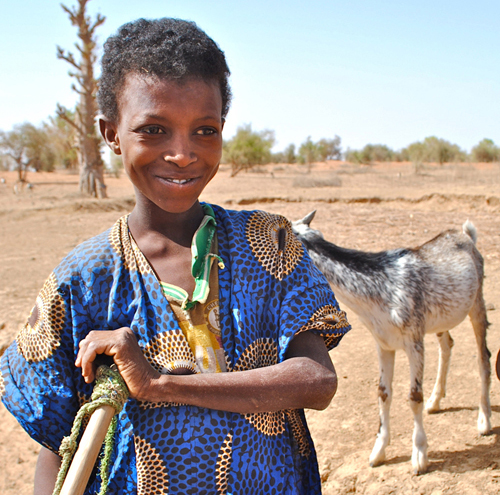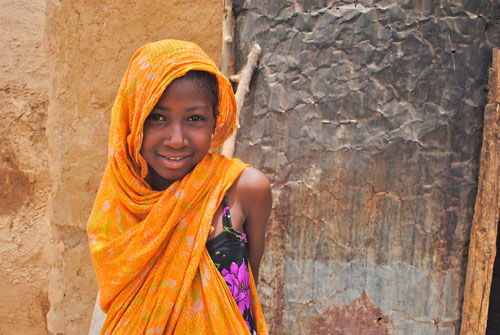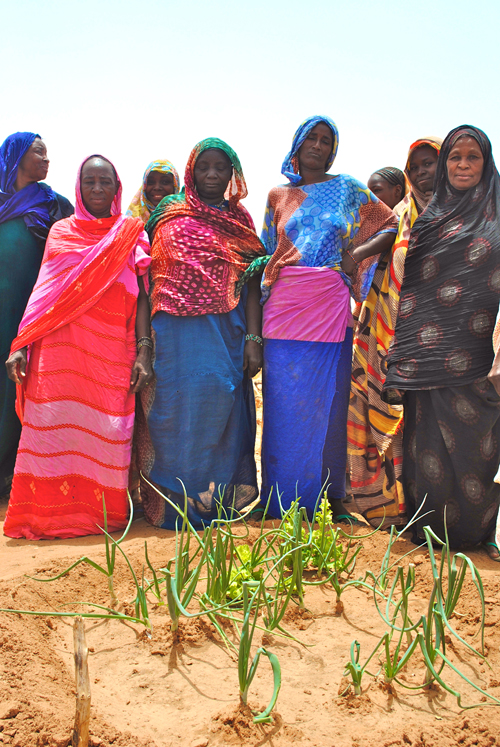
This blog is part of a series organized by The Huffington Post and the NGO alliance InterAction to call attention to the crisis in the Sahel, a region in sub-Saharan Africa where more than 18 million people face starvation and 1.1 million children under the age of 5 are at risk of dying from acute malnutrition. Click here to read more of HuffPost Impact's coverage of the Sahel and here to find out what InterAction members and others are doing in the Sahel.
When we think of responses to malnutrition and ways to help communities survive crises like food shortages and drought, many people's minds often turn to visions of warehouses full of food for distribution to communities unable to pull themselves out of poverty.
As international development practitioners, we realize that food-based responses, while immensely valuable for basic survival in times of crisis, are not always the most effective in promoting sustainable, long-term recovery and resiliency.
We often think of projects involving microfinance and economic development in terms of catalyzing markets and creating entrepreneurs, and of bringing people in impoverished communities into the world of business. We don't often think of them as a vehicle for preventing malnutrition and helping communities survive crises like food shortages and droughts.
In Counterpart's programming in Mauritania, however, microfinance does just that. During a recent field visit, I was able to see just how powerful microfinance has been for Mauritanian communities struggling to put food on the table in the midst of the country's worst drought in 15 years.

Photo: Alisha Rodriquez/Counterpart International.
A young man tends to his herd of sheep. Livestock plays a crucial part in the livelihoods of Mauritanians, and a Counterpart program aims to keep flocks healthy through the current drought.
A first-hand look at the change
We drove across Mauritania's southern Sahel zone without seeing much more than a few camels and struggling trees.
Many of the villages where Counterpart implements its Community Action for Nutrition and Livelihoods program are extremely remote -- maybe two or three hours' drive from a small city, and six to 10 miles or more from a small town with basic shops and services. They would seem too isolated for economic development, lacking the support services and customer base one imagines for microfinance projects.
But Counterpart's microfinance activities have been incredibly transformative for our beneficiaries in rural communities.

Photo: Alisha Rodriquez/Counterpart International.
With the food crisis in the Sahel region growing more acute, children are at the greatest risk. Families say they have cut back on meals.
Small business loans have enabled entrepreneurial residents to bring vital goods and services to their remote villages. When rains are scarce and crops fail, as they did in the last harvest across Mauritania, a simple convenience store provides communities with easier access to affordable food. When the nearest town center is 10 miles away and you're traveling on foot or by donkey, being able to buy staple foods in your village is an immense benefit.
Starting a small business also makes rural families less at risk when their harvests are meager; diversifying income sources gives families a safety net, helps them build assets and makes them more resilient when a crisis happens.
Loan beneficiaries receive basic training in such business skills as bookkeeping and inventory management. Managers of the Counterpart's local microcredit partner say they originally had to work intensively with communities to develop successful business plans; now, they say, with the provision of basic entrepreneurship training, potential loan recipients have become savvier, presenting coherent, feasible business plans in 15 minutes.
From pharmacies to convenience stores to one-room gas stations, beneficiaries are thinking of creative ways to leverage microcredit funds to increase their incomes while responding to the service needs of their communities. And the benefits are exponential: Not only do loan recipients have a stable source of income that helps their families meet basic needs and generate savings, but the services they provide stimulate trade, create markets in villages previously underserved by other businesses, and open up transportation corridors to formerly isolated communities. A single small business can put a village on the trade map and bring with it a variety of other goods and services.
For business owners and their communities, increased trade and income mean increased food security and reduced malnutrition. A convenience store, a butcher shop or a bakery brings affordable food into the community. Beneficiaries say that these new businesses have improved nutrition and health for their families and their neighbors.
Counterpart's success
Counterpart has helped deliver 926 microloans to 3,000 recipients -- most of them women -- through its local partner, providing entrepreneurs with a total of $570,000. To date, 90 percent of borrowers have kept up on the payments.
The current drought crisis in Mauritania threatens that high success rate. Everyone is squeezed by poor crop yields, declining livestock earnings and rising food prices. Managers of Counterpart's microcredit branches say beneficiaries are struggling to repay loans under the increased burden of food insecurity.
With severe food shortages, households are forced to divert an increased proportion of profits from their businesses to buying food -- thus compromising their ability to make loan payments. Microfinance managers say they hope these families will begin to recover within the next few months, but persistent drought, food shortages and malnutrition don't show signs of letting up. With such enterprises bringing food, income and services to beneficiary villages, we hope they will be able to survive the crisis until the rains finally come.

Photo: Alisha Rodriquez/Counterpart International.
Small grants help local communities survive the long dry season and allow them to start new businesses like convenience stores and pharmacies.